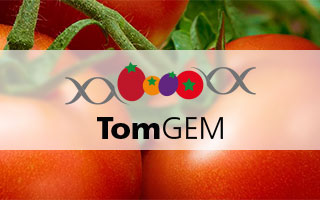Improving yield and quality of tomato varieties in the face of climate change
Launch of EU research project TomGEM with total budget of € 5.6 million
Fresh fruits and vegetables are essential components of a healthy diet and are part of our everyday meals. For instance, fleshy fruits such as tomatoes, oranges or cherries provide an important source of vitamins, minerals, fibres and antioxidants. However, in the face of rapidly changing and increasingly extreme climate conditions, there is a need to design new strategies aimed at maintaining high yields of fruit and vegetables produced in unprecedented environmental conditions. An important objective of breeders is therefore to select varieties with a better fitness to adverse conditions, and to limit environmental impacts on crop production and quality by optimising genotypes and horticultural management practices. Against this backdrop the recently launched project TomGEM sets out to design new strategies to maintain high yields of fruit and vegetables produced in harsh temperature conditions, using tomato as a reference fleshy fruit crop.
Funded by the European Union with a total budget of € 5.6 million over the next 4 years, TomGEM will consider all developmental processes contributing to yield and to implement trans-disciplinary approaches to investigate the impact of high temperatures on these traits. “Fruit production is determined by the interaction of genetic and environmental factors, as well as by horticultural management practices. So if we gain a better understanding of these factors, we will be able to translate scientific insight into practical strategies for handling the interactions between them, and to thus offer holistic solutions to the challenge of increasing food quality and productivity in the face of global warming”, says Prof Mondher Bouzayen from Institut National Polytechnique de Toulouse and TomGEM coordinator underlining the overall objective of the project.
A large part of the research activities of the consortium consisting of 18 partner institutions from Europe, Argentina and Taiwan will deal with the mining of a vast range of genetic resources to identify cultivars/genotypes displaying yield stability under heat stress conditions and to uncover loci/genes controlling flower initiation, pollen fertility and fruit set. Once these loci/genes are characterized, the ultimate goal will be to design strategies for pyramiding the favourable versions of these loci into a single genotype that can serve as parent line in tomato breeding. However, high yield and elevated temperatures can be detrimental to quality traits. Therefore, TomGEM will also tackle the issue of fruit quality under elevated temperatures, in order to come up with innovative breeding and management strategies providing tomato producers with commercial varieties ensuring high yield under heat stress conditions with no penalties in terms of fruit quality, for a broad range of geographic conditions.
As management partner, Eurice will assist the TomGEM consortium in the overall project, financial and exploitation management, and will furthermore ensure successful project communications at internal and external level.
The partners in TomGEM at a glance:
- Argentina
Universidad de Buenos Aires - Bulgaria
Maritsa Vegetable Crops Research Institute - France
Institut National de la Recherche Agronomique
Institut National Polytechnique de Toulouse
SAS Rougeline - Germany
European Research and Project Office GmbH
Max Planck Gesellschaft zur Foerderung der Wissenschaften e.V. - Italy
Alma Seges Soc. Cop.
Biotecgen SRL
Università degli studi di Napoli Federico II - Spain
Agencia Estatal Consejo Superior de Investigaciones Científicas
Enza Zaden España S.L.
Fundación Cajamar Comunidad Valenciana - Taiwan
AVRDC - The World Vegetable Center
National Taiwan University - UK
John Innes Centre
Royal Holloway and Bedford New College
Norfolk Plant Sciences Ltd
Your Contact
Dr Verena Peuser
Phone: +49 30 374415832
Email
Tags: Horizon 2020

